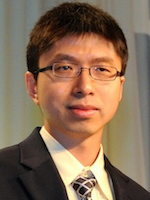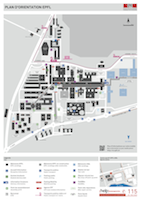Go to
Zhiru Zhang
Mapping-aware Logic Synthesis with Parallelized Stochastic Optimization
 Assistant Professor
Assistant Professor
School of Electrical and Computer Engineering
College of Engineering
Cornell University
Ithaca, New York, USA
Friday, 29 September 2017 at 9:00 in room BC 420
Abstract:
About the speaker:
Zhiru Zhang is an Assistant Professor in the School of Electrical and Computer Engineering at Cornell University and a member of the Computer Systems Laboratory. His research currently focuses on design automation for heterogeneous computing, including high-level synthesis, architecture and compiler optimization for hardware specialization, parallel programming for reconfigurable systems, and approximate computing substrate. His work has been recognized with an NSF CAREER Award (2015), the Ross Freeman Award for Technical Innovation from Xilinx (2012), a Best Paper Award from the ACM Transactions on Design Automation of Electronic Systems (2012), and a best paper nomination at the International Conference on Computer-Aided Design (2009).
Prior to joining Cornell, Zhang received his Ph.D. in Computer Science from the University of California, Los Angeles (UCLA). In 2006, he co-founded AutoESL Design Technologies, Inc. based on his dissertation research at UCLA on high-level synthesis. AutoESL was acquired by Xilinx in 2011 and the AutoESL tool was later rebranded as Vivado HLS; from 2011 to 2012, he served as a software development manager at Xilinx. Zhang have a B.S. in Computer Science from Peking University, and an M.S. in Computer Science from UCLA.
Secondary navigation
- EPFL Workshop on Logic Synthesis and Emerging Technologies
- Luca Amaru
- Luca Benini
- Giovanni De Micheli
- Srini Devadas
- Antun Domic
- Rolf Drechsler
- Pierre-Emmanuel Gaillardon
- Jie-Hong Roland Jiang
- Akash Kumar
- Shahar Kvatinsky
- Yusuf Leblebici
- Shin-ichi Minato
- Alan Mishchenko
- Vijaykrishnan Narayanan
- Ian O'Connor
- Andre Inacio Reis
- Martin Roetteler
- Julien Ryckaert
- Mathias Soeken
- Christof Teuscher
- Zhiru Zhang
- Symposium on Emerging Trends in Computing
- Layout synthesis: A golden DA topic
- EPFL Workshop on Logic Synthesis & Verification
- Luca Amaru
- Luca Benini
- Robert Brayton
- Maciej Ciesielski
- Valentina Ciriani
- Jovanka Ciric-Vujkovic
- Jason Cong
- Jordi Cortadella
- Giovanni De Micheli
- Antun Domic
- Rolf Drechsler
- Henri Fraisse
- Paolo Ienne
- Viktor Kuncak
- Enrico Macii
- Igor Markov
- Steven M. Nowick
- Tsutomu Sasao
- Alena Simalatsar
- Leon Stok
- Dirk Stroobandt
- Tiziano Villa
- Symposium on Emerging Trends in Electronics
- Raul Camposano
- Anantha Chandrakasan
- Jo De Boeck
- Gerhard Fettweis
- Steve Furber
- Philippe Magarshack
- Takayasu Sakurai
- Alberto Sangiovanni-Vincentelli
- Ken Shepard
- VENUE
- Panel on Circuits in Emerging Nanotechnologies
- Panel on Emerging Methods of Computing
- Panel on The Role of Universities in the Emerging ICT World
- Panel on Design Challenges Ahead
- Panel on Alternative Use of Silicon
- Nano-Bio Technologies for Lab-on-Chip
- Functionality-Enhanced Devices Workshop
- More Moore: Designing Ultra-Complex System-on-Chips
- Design Technologies for a New Era
- Nanotechnology for Health
- Secure Systems Design
- Surface Treatments and Biochip Sensors
- Security/Privacy of IMDs
- Nanosystem Design and Variability
- Past Events Archive
On-Line Registration
Workshop registration is mandatory but free of charge. Please click here to go to the on-line registration form.
Thank you very much for your interest in our workshop. Registration is now closed.
Downloads
Presentation slides:
Venue
All talks will take place at EPFL room BC 420. Please click here to go to the interactive EPFL map.

